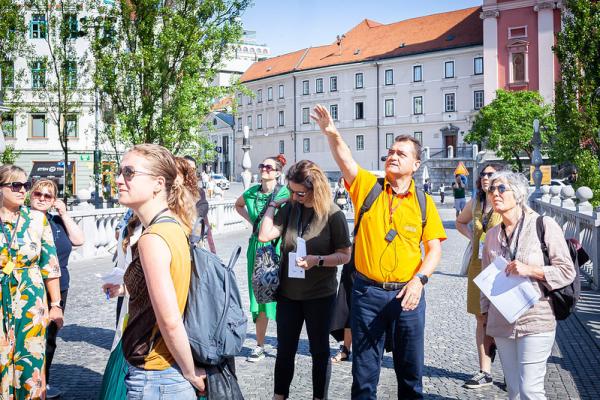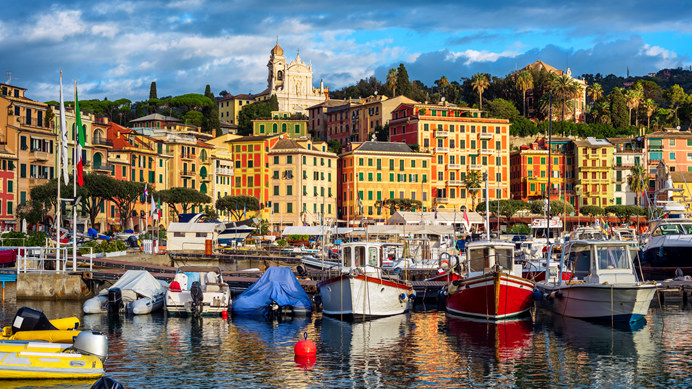
Cities central to EU sustainability efforts as tourism hits decade high
Beyond these restrictions, cities are looking for ways to encourage tourism that is better for local communities and the environment – while remaining competitive, and protecting jobs and wellbeing for residents. Facing challenges such as over tourism, inaccessible prices for locals, or economic vulnerability through excessive specialisation and seasonality, while navigating the green and digital shift, cities are looking for extra support, for example through networks, funding, exchanges and better knowledge.
EU Cohesion policy boosting cities’ role in sustainable tourism
EUI supports towns and cities in developing innovative responses to these sustainable urban tourism challenges at the local level. The initiative reflects EU Cohesion policy’s recognition of the power of cities to drive transition in an industry that represents 10% of EU GDP, and employs more than 20 million people.
Other relevant EU programmes and partnerships include URBACT, Horizon 2020 – and the Urban Agenda for the EU (UAEU) Thematic Partnership for Sustainable Tourism, launched in 2022 to focus on “specific issues related to tourism in cities as a crucial component of a sustainable development of urban economies”.
EU support for sustainable tourism was particularly valuable during the pandemic, when the industry took a huge blow, showing a 41% drop in revenues from 2019 to 2020. Today, the 2021-2027 European Regional Development Fund (ERDF) includes EU planned allocations of EUR 3.65 billion in direct support for sustainable tourism, and EUR 3.73 billion dedicated to EU Cohesion Policy specific objective 4.6 on culture and sustainable tourism.
What exactly is sustainable tourism?
Sustainable tourism “takes full account of its current and future economic, social and environmental impacts, addressing the needs of visitors, the industry, the environment and host communities,” according to the UN World Tourism Organisation.
For the Urban Agenda for the EU Sustainable Tourism partnership, “sustainable tourism requires a balance between economic, social, cultural, and environmental sustainability. The approach to supporting sustainable tourism should be in accordance with the Commission Communication ‘Agenda for a sustainable and competitive European tourism’. In particular, it should take into account the welfare of tourists, respect the natural and cultural environment and ensure the socio-economic development and competitiveness of destinations and businesses through an integrated and holistic policy approach.”
Emerging issues include mobility, climate change, food waste, eco-certifications, digitalisation, skills, accessibility, social inclusion and social innovation. And how short-term rentals can thrive in cities as part of a well-balanced tourist ecosystem. Managed properly, sustainable, smart urban tourism can act as a driver of local development and innovation, impacting positively on the surrounding region.
Sustainable tourism is a complex cross-cutting concept involving three main sets of actors – sustainable destinations, sustainable companies and responsible tourists. It is also multidimensional, linking in to nearly all the UN Sustainable Development Goals. It falls under three major EU policy areas: strategies guiding the green and digital transitions; policies designed for cities and urban development; and tourism policy, which in itself is complex as national and regional approaches vary hugely. All in all, supporting sustainable tourism involves considering a wide variety of policy objectives and tools.

EUI support for integrated, locally-led sustainable tourism
While sustainable urban tourism involves regional, national, European, and global activities, such as online platforms, major hotel chains and airlines, tourism is of course place-based. It needs local knowledge of the specific context, and local actors to design interventions and regulations adapted to local needs. This is why towns and cities have such a key role to play.
EUI provides support to urban areas of all sizes, with capacity building, funding for innovative actions in cities, sharing knowledge and capitalising on experiences. This includes supporting cities and their partners in their development of innovative solutions and policies for the governance, management and promotion of sustainable urban tourism. Here are a few examples:
- Learning from Innovative Actions on sustainable tourism
The second Call for Proposals of EUI - Innovative Actions (now closed) targeted innovative projects focusing on three topics, including the topic ‘Sustainable tourism’. 32 applications supporting the long-term green and digital transformation and resilience of the tourism ecosystem have been submitted. Selected cities will introduce unique solutions and comprehensive policies for the promotion and management of sustainable tourism, setting examples for smaller towns, villages and regions that are more dependent on tourism for their economy.
- Exchange with a peer city on sustainable tourism challenges
City-to-city exchanges are a chance for EU urban authorities of any size to meet with peer cities to focus on a specific policy challenge – including sustainable tourism – related to the design and implementation of Sustainable Urban Development. Peers share practical knowledge and know-how to help tackle the identified challenge in its specific urban context.
- Find all the knowledge you need for sustainable tourism on Portico, the European gateway to urban learning
This wealth of knowledge and practical information on urban topics includes regularly updated EU resources on sustainable urban tourism – from reports and studies, to partnerships and urban stories. The new European urban knowledge platform was developed by EUI, with partners such as UAEU, URBACT, Interreg Europe, the European Commission’s Joint Research Centre (JRC) and the International Urban and Regional Cooperation partnership. It also includes the knowledge captured from cities’ experiments under Urban Innovative Actions (UIA).
Latest news from the Urban Agenda for the EU partnership on Sustainable Tourism
Understanding the need for a multi-level, multi-stakeholder approach to investigate multiple issues of sustainable urban tourism, and help bring together the EU’s various policies and legislation, this 29-strong partnership is co-coordinated by the Municipalities of Genoa (Italy) and Galati (Romania) and includes national, regional, city authorities, relevant services of the European Commission, Eurocities, ICLEI Europe, and other stakeholders .
Partners focus on the environmental impact of the tourism industry in cities, tourism’s contribution to urban socio-economic development, as well as unbalanced growth and tourism flows in cities facing over tourism. Their work covers three key areas:
1. Better regulation, on issues such as Short-term rentals; Eco-certifications and better use of EU tools by tourist companies; Cross-border transportation; Digital interoperability; and Data collection – including the new EU Tourism Dashboard developed by the JRC, to provide visualisations of tourism-relevant indicators relating to policy objectives on green and digital transitions, and socio-economic resilience factors of the European tourism ecosystem.
2. Better knowledge, for example on Smart data use; Tourism congestion strategies such as trying out new technological solutions to deal with over tourism; Collaborative governance and good practice exchanges on sustainable tourism themes, for example European Capital of Smart Tourism, the European Heritage Awards, provide a valuable knowledge base of good practices.
3. Better funding, including for Urban mobility for tourism; Funding for digital tourism services, especially for digital skills in SMEs; Innovating in new tourism approaches, such as technologies for the green transition; and support for New entrepreneurship and high-tech start-ups to boost innovation. This EU guide shines light on funding opportunities in this area.
More details can be found on the next activities of the partnership in the Sustainable Tourism Partnership’s Orientation paper, May 2023.

What next?
The need for city-level innovative actions and smooth multi-stakeholder, multi-level cooperation looks set to grow as the tourism ecosystem becomes more complex in the years ahead. According to the European Commission’s Transition pathway for tourism, for example, the green transition is expected to include binding targets to reduce food waste across the EU, harmonised rules on the uptake and supply of sustainable aviation fuels, CO2 emission standards for cars, and new rules on urban waste treatment.
The Sustainable Tourism Partnership of the Urban Agenda for the EU (UAEU) continues, with partners set to define actions to improve urban tourism processes to respect the environment, social realities and economic dynamics, and generate added value for visitors and local communities.
In line with its goal to contribute to the design of a new generation of EU tourism policies, the UAEU sustainable tourism partnership e-ante assessment notes, “The tourist ecosystem needs all possible support in managing a phase that is not a mere ‘back to normal’. And such support is needed now.”
Latest EU knowledge and resources on sustainable tourism are available on Portico, the gateway to urban learning.
